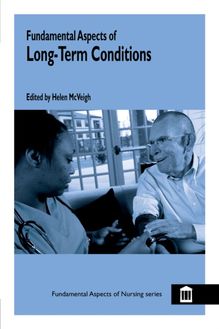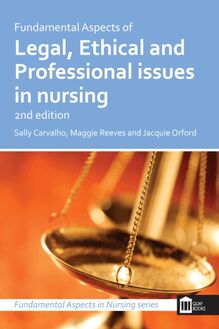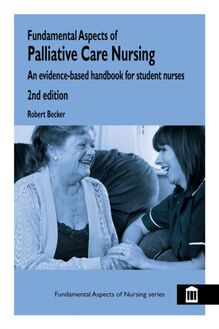Fundamental Aspects of Legal, Ethical and Professional Issues in Nursing 2nd Edition , livre ebook
51
pages
English
Ebooks
2012
Vous pourrez modifier la taille du texte de cet ouvrage
Obtenez un accès à la bibliothèque pour le consulter en ligne En savoir plus
Découvre YouScribe en t'inscrivant gratuitement
Découvre YouScribe en t'inscrivant gratuitement
51
pages
English
Ebooks
2012
Vous pourrez modifier la taille du texte de cet ouvrage
Obtenez un accès à la bibliothèque pour le consulter en ligne En savoir plus
Publié par
Date de parution
06 juillet 2012
Nombre de lectures
0
EAN13
9781856424462
Langue
English
Publié par
Date de parution
06 juillet 2012
Nombre de lectures
0
EAN13
9781856424462
Langue
English
Title page
Fundamental aspects of legal, ethical and professional issues in nursing
2nd Edition
by
Sally Carvalho, Maggie Reeves and Jacquie Orford
Copyright page
Quay Books Division, MA Healthcare Ltd, St Jude’s Church, Dulwich Road, London
SE24 0PB
© MA Healthcare Limited 2011
1st edition printed 2002
Reprinted 2007
Digital version 2012
All rights reserved. No part of this publication may be reproduced, stored in a retrieval system or transmitted in any form or by any means, electronic, mechanical, photocopying, recording or otherwise, without prior permission from the publishers.
Edited by Jessica Anderson
Cover design by Claire Majury
A & D Media Ltd
Associate Publisher: Thu Nguyen
Digital version by Andrews UK Limited
www.andrewsuk.com
Note
Healthcare practice and knowledge are constantly changing and developing as new research and treatments, changes in procedures, drugs and equipment become available.
The author and publishers have, as far as is possible, taken care to confirm that the information complies with the latest standards of practice and legislation.
Foreword to the 2nd Edition
The publication of the 2nd edition this book has been timed to coincide with significant change in nursing and the wider healthcare context. The move towards an all graduate profession, and publication in 2010 of the new Nursing and Midwifery Council standards for pre-registration nursing, demonstrate a commitment to prepare nurses to provide care confidently in transformed health services and to meet changing patterns of healthcare need.
The population is undeniably living longer; healthcare must be able to provide for those who are critically ill, and for those who are increasingly old and living with long-term conditions who wish to be partners in their care and have their individual needs addressed in different ways. Graduate nurses are expected to demonstrate advanced knowledge and skills and to apply these competently to the planning and delivery of high quality care that is appropriate for the individual needs of each patient. However, it is not sufficient just to know ‘how’ to do something competently, the nurse must also know why. Nurses must be prepared to explain to others why they have taken a particular course of action. Most nursing activities are complex and involve making a number of judgements. In order to be able to make good decisions that will meet legal requirements, professional standards, and public expectations, the nurse must have a good understanding of the legal, ethical and professional context within which they work. The chapters of this book are designed to reflect the Nursing and Midwifery Council’s four key competency domains of nursing: professional values; communication and interpersonal skills; nursing practice and decision-making; and leadership, management and team working.
This book provides readers with an introduction to the underpinning knowledge and values necessary to be a ‘good’ nurse. It provides an up-to-date legal framework for care and provides practical activities through which readers can explore professional issues and values and their application to practice. I believe this book will be useful both for those setting out on the pathway to be a nurse and for those who are more experienced who want to reflect on their care.
Jan Quallington
Associate Head Institute of Health and Society
University of Worcester
Acknowledgements
We would like to acknowledge the help of the many people who have assisted in the writing of this book.
Firstly, we thank the many students and colleagues with whom we have worked during our nursing and teaching careers. During this time, we have learnt how to answer questions and to find out answers, and to try to give these answers at the level the individual could understand. Students, in particular, have tested us to ensure that they have got the answer to their satisfaction and have challenged us with examples from clinical practice - some of which are included in this book. Without this learning, this book could not have been written.
Secondly, we thank those who have offered advice and information over the years and have contributed to our knowledge. Our specific thanks go to Jan Quallington for writing the Foreword to this edition, and all the other authors acknowledged through the text.
Our thanks go to Mike Reeves and Steve, Christopher and Victoria Orford for ‘putting up with’ our book writing, and the inconvenience this often causes.
Special acknowledgement goes to Barbara Carvalho, who celebrated 50 years as a nurse in September 2010; thank you, Mum, for your inspirational professional guidance and support.
We would like to dedicate this book to students past and present and hope that the Fundamental Aspects of Legal, Ethical and Professional Issues in Nursing (2nd Edition) will be a helpful tool for study and in nursing practice.
Sally Carvalho, Maggie Reeves and Jacquie Orford
Chronological table of statutes
Offences Against the Person Act 1861
Suicide Act 1961
Abortion Act 1967
Family Law Reform Act 1969
Misuse of Drugs Act 1971
Health and Safety at Work Act 1974
Nurses, Midwives and Health Visitors Act 1979
Mental Health Act 1983
Public Health (Control of Diseases) Act 1984
Hospital Complaints Procedure Act 1985
Access to Medical Reports Act 1988
Road Traffic Act 1988
Children Act 1989
Computer Misuse Act 1990
Human Fertilisation and Embryology Act 1990
Disability Discrimination Act 1995
Data Protection Act 1998
Human Rights Act 1998
Public Interest Disclosure Act 1998
Health Act 1999
Anti-Terrorism, Crime and Security Act 2001
Health and Social Care Act 2001
Sexual Offences Act 2003
Children Act 2004
Mental Capacity Act 2005
NHS Act 2006
NHS Redress Act 2006
Safeguarding Vulnerable Groups Act 2006
Mental Health Act 2007
Equity Act 2010
Table of cases
Blyth v Birmingham Waterworks Co. [1856] 11EXCH 781
Bolam v Friern Barnet HMC [1957] 2 All ER 118
Chatterton v Gerson [1981] 1 All ER 257
Gillick v West Norfolk and Wisbech AHA [1986] AC 112 (HL)
Janaway v Salford HA [1988] 3 WLR 1350 (HL)
Kay v Ayrshire and Arran Health Board [1987] 2 All ER 417
Maynard v West Midlands Regional Health Authority [1984] 1 WLR 634
Tarasoff v Regents of University of California 17 Cal 3d 425 (1976) (USA)
W v Edgell [1990] 1 All ER 855 CA
Whitehouse v Jordan [1981] 1 All ER 267
Wilsher v Essex Health Authority [1986] 3 All ER 801
Wilsher v Essex AHA [1988] QB 730 CA
Introduction
This book is aimed at those who are new to the fundamental concepts of legal, ethical and professional issues in nursing and who may want help in understanding them. This may be student nurses, when they come across these themes in their pre-registration nursing programme, or qualified nurses who are supervising such students in clinical practice. Hopefully, this book will provide a foundation.
It will look at the three issues - legal, professional and ethical - as separate entities. This is to help the reader understand the concepts in a better way. Although these topics will be looked at separately, in clinical nursing practice they are nearly always combined together. One way of imagining this is to consider a plait of hair. Each of the three strands is separate, but when plaited they are one.
When this occurs in the book, you will see this symbol:
For the purposes of this text, the term ‘patient’ will refer to service users as well as patients. The term ‘nurse’ relates to all fields of nursing and specialist community public health nurses.
Law and ethics are the frameworks within which professional issues are discussed and measured. This does not mean that the law has no morals or there is no law in professional aspects of nursing. They are intertwined.
The Health Service Circular 219.99 (Department of Health 1999) introduced the requirements for a revised nursing education programme. Under the Nursing and Midwifery Order 2001, the Nursing and Midwifery Council (NMC) is required to establish standards and minimum requirements for pre-registration nursing education. This book will help students to achieve the following NMC’s (2010) generic competencies for entry to the register.
Competencies for entry to the NMC register
Domain 1: Professional values
All nurses must act first and foremost to care for and safeguard the public. They must practice autonomously and be responsible and accountable for safe, compassionate, person-centred, evidence-based nursing that respects and maintains dignity and human rights. They must show professionalism and integrity and work within recognised professional, ethical and legal frameworks. They must work in partnership with other health and social care professionals and agencies, service users, their carers and families, in all settings, including the community, ensuring that decisions about care are shared (Nursing and Midwifery Council 2010: 13).
Domain 2: Communication and interpersonal skills
All nurses must use excellent communication and interpersonal skills. Their communications must always be safe, effective, compassionate and respectful. They must communicate effectively using a wide range of strategies and interventions including the effective use of communication technologies. Where people have a disability, nurses must be able to work with service users and others to obtain the information needed to make reasonable adjustments that promote optimum health and e



